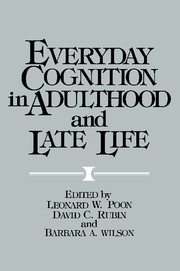Book contents
- Frontmatter
- Contents
- List of contributors
- Preface
- Part I Adult cognitive abilities in the laboratory and in real-life settings: Basic theoretical and methodological issues
- Part IA Systematic approaches to laboratory and real-world research
- Part IB Combining laboratory and real-world research
- Part II Cognition in adulthood and late life: Findings in real-life settings
- Part IIA Everyday cognitive abilities
- Part IIB Concomitant influences
- 21 Motivation and aging
- 22 Questionnaire research on metamemory and aging: Issues of structure and function
- 23 The importance of awareness in memory aging
- 24 Age and expertise: Responding to Talland's challenge
- 25 World-knowledge systems
- 26 Comments on aging memory and its everyday operations
- Part III Cognitive enhancement and aging: Clinical and educational applications
- Part IIIA Issues and perspectives
- Part IIIB Enhancement approaches
- Part IIIC Designing programs for cognitive rehabilitation
- Subject index
- Author index
21 - Motivation and aging
Published online by Cambridge University Press: 05 October 2013
- Frontmatter
- Contents
- List of contributors
- Preface
- Part I Adult cognitive abilities in the laboratory and in real-life settings: Basic theoretical and methodological issues
- Part IA Systematic approaches to laboratory and real-world research
- Part IB Combining laboratory and real-world research
- Part II Cognition in adulthood and late life: Findings in real-life settings
- Part IIA Everyday cognitive abilities
- Part IIB Concomitant influences
- 21 Motivation and aging
- 22 Questionnaire research on metamemory and aging: Issues of structure and function
- 23 The importance of awareness in memory aging
- 24 Age and expertise: Responding to Talland's challenge
- 25 World-knowledge systems
- 26 Comments on aging memory and its everyday operations
- Part III Cognitive enhancement and aging: Clinical and educational applications
- Part IIIA Issues and perspectives
- Part IIIB Enhancement approaches
- Part IIIC Designing programs for cognitive rehabilitation
- Subject index
- Author index
Summary
This literature review will examine the effects of motivation on mental activity in the aged. It will show that motivation significantly affects performance on a variety of tasks, but does not eliminate age-related cognitive deficits. The findings demonstrate that failure to consider the influence of motivation on performance in the aged can lead to an exaggeration of the magnitude of the deleterious effects of aging on cognitive functioning, and an increase in motivation can improve memory functioning in aged individuals, including those who are experiencing memory problems.
Statement of the problem
Historically, one of the major foci of experimental psychology was on variables associated with the phenomenon of learning. Because learning was differentiated from performance, an attempt was made to identify variables that affected performance versus those that affected learning. Specifically, it was recognized (Hull, 1943) that learning, defined as a relatively permanent change in behavioral potential, needed to be distinguished from performance, defined as the measurable expression of that which an organism had learned. Moreover, performance was not considered to be isomorphic with learning; rather, learning set an upper bound on performance. An organism could not display (perform) more than it had learned. On the other hand, an organism could and in most cases did perform at a lower level than that attained by learning.
- Type
- Chapter
- Information
- Everyday Cognition in Adulthood and Late Life , pp. 373 - 393Publisher: Cambridge University PressPrint publication year: 1989
- 5
- Cited by



